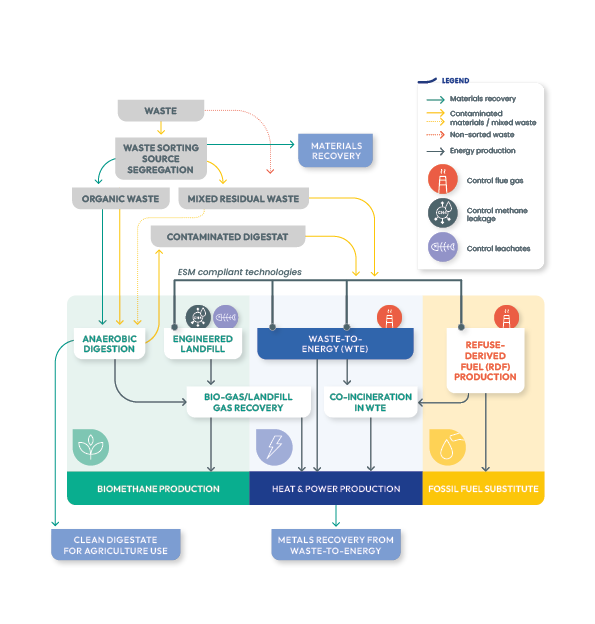Globally, the waste sector (including wastewater management) accounts for about 3–5% of global GHG emissions, according to the IPCC estimates. However, this share varies widely by country. In several island and small states, waste-related emissions can reach 20–30% of national totals. High shares are found in Costa Rica (28%), Ghana (23%), Bulgaria (21%), Eswatini (20%), Bhutan (20%), Georgia (18%), Jordan (17%), El Salvador (16%), Niger (15%), and Syria (15%).
Furthermore, the accounting principle for emissions, which primarily aims to avoid double counting, results in the invisibilization of emissions from the sector. Indeed, waste transport, recycling activities, and energy production from waste are accounted for in the transport, industry, and energy sectors... Thus, the reduction potential through waste prevention and management actions would represent 15 to 25% of global emissions.

There are three main levers for reducing GHG emissions from the waste sector:
Prevention
This first lever relies on resource-efficient consumption, eco-design, and the “8Rs” (refuse, rethink, reduce, reuse, repair, refurbish, remanufacture and repurpose). Implementing this approach — which reduces waste generation — offers the greatest mitigation potential. Special attention should be given to food waste, to prevent emissions from unnecessary production and from its treatment, which can become a major source of methane emissions.
Managing Biowaste and Eliminating Open Burning
This second lever focuses on implementing waste management practices consistent with ESM, whose main objective — as defined by the Basel Convention — is the protection of health and the environment. It is estimated that nearly 40% of municipal waste generated worldwide is poorly managed. Landfilling waste in sites that do not apply sound construction and operation practices results in methane emissions.
Open burning or spontaneous fires at dumpsites produce black carbon — both of which have strong warming effects. Reducing these emissions represents a major opportunity for climate mitigation, while also protecting health and the environment.
Methane remains in the atmosphere for about 12 years and has a global warming potential 84 times greater than CO₂ over a standardized period of 20 years for calculating CO2 equivalents.
Because methane emissions have a strong short-term impact, actions taken now can deliver immediate benefits in slowing the warming trend.
Recovery of Recycled Materials and Energy from Waste
This third lever promotes waste treatment methods that avoid emissions which would otherwise occur through fossil resources consumption in other sectors (e.g., industry, district heating).
Energy can be recovered from:
• Anaerobic digestion of organic waste,
• Biogas capture from engineered landfills,
• Waste to Energy plants (WtE), or
• Refused Derived Fuel (RDF) production.
This lever represents the final link in the transition toward a circular economy, but prevention will always remain the top priority for reducing not only climate impacts, but also pollution and biodiversity loss.

Enhancing circular economy
Enhancing circular economy is a means to conserve resources so that they can be used several times for various usages after their extraction (primarily as raw materials or, if not feasible, in the form of energy). Beyond being necessary to address planetary boundaries, circular economy can be, and must be designed to also reduce GHG emissions when producing needed goods.
Waste sector professionals have to work hand in hand with other sectors: contributing to eco-design; supplying low-carbon raw materials and energy; developing a market for the recovered energy and materials.
Beyond being necessary to address planetary boundaries, circular economy can be, and must be designed to also reduce GHG emissions when producing needed goods, in line with the 10Rs, and the ISO norm 59004:2024.

























